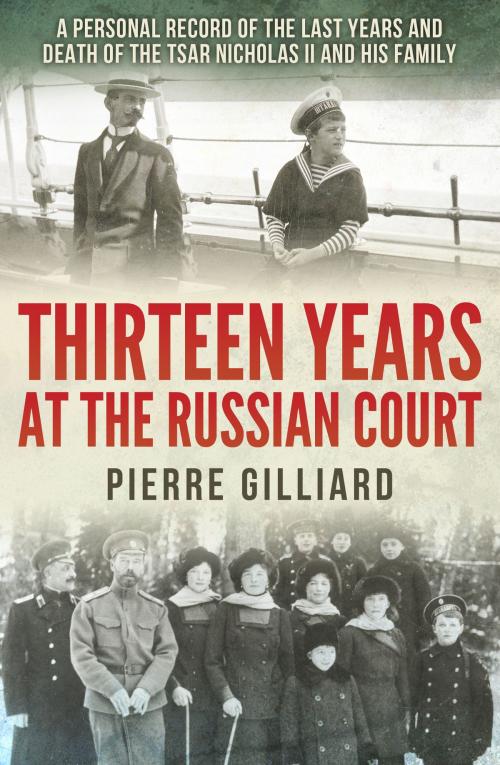Thirteen Years at the Russian Court
A Personal Record of the Last Years and Death of the Tsar Nicholas II, and His Family
Nonfiction, History, Revolutionary, Asian, Russia, Biography & Memoir, Historical| Author: | Pierre Gilliard | ISBN: | 1230003263242 |
| Publisher: | Chord Publishing | Publication: | June 5, 2019 |
| Imprint: | Language: | English |
| Author: | Pierre Gilliard |
| ISBN: | 1230003263242 |
| Publisher: | Chord Publishing |
| Publication: | June 5, 2019 |
| Imprint: | |
| Language: | English |
In September 1905 Pierre Gilliard entered Tsar Nicholas II’s household as the French tutor of Duchesses Olga Nicolaievna and Tatiana Nicolaievna.
He would go on to spend a further thirteen years in the close company of the Romanov family.
Within that time he would be a witness to one of the most remarkable and tragic events of modern history as a close-knit family was torn apart and executed in the midst of the Revolution.
But this book is more than simply an eyewitness account of the Revolution.
As one of the books early reviews notes, Gilliard ‘had unusual opportunities of knowing their simple domestic life, and when the tragedy that had befallen the Royal house inevitably drew its members, and the few of their attendants who were left to them, more closely together, he was able to learn more and more intimately the ties that bound them together and the difficulties that had brought them to such a doom.’ The Tablet
Throughout his thirteen years Gilliard built strong personal relationships with those at the Russian court and his eyewitness account of that time is a beautifully intimate portrayal of the family.
From little Aleksey who despite his haemophilia remained the centre of attention to his mischievous sisters, their anxious mother and proud father, Gilliard provides vivid sketches of each of the family members.
He was also witness to figures outside of the family circle, including the infamous Rasputin.
Throughout the account there are extremely personal notes interspersed with humour which provide a humanising view of the Romanov family, including the moment when Gilliard forgets to censor some of the language in Les Miserables to which Tsar Nicholas II teases with him: “You are teaching my daughters a very curious vocabulary, monsieur…”
In 1914 Russia descended into war and over the coming years as the situation on the front becomes more tense so too does life within the court.
The strain upon court and nation comes to a climax in March 1917 as the Revolution begins.
Even through their abdication and imprisonment Gilliard remained with the family, until finally in 1918, after the Bolshevik’s coup d’etat, Gilliard is separated from them, never to see them again.
Pierre Gilliard’s remarkable and tragic account of the last years of the Romanov dynasty was first published in 1921. He later became a French professor at the University of Lausanne and died in 1962.
In September 1905 Pierre Gilliard entered Tsar Nicholas II’s household as the French tutor of Duchesses Olga Nicolaievna and Tatiana Nicolaievna.
He would go on to spend a further thirteen years in the close company of the Romanov family.
Within that time he would be a witness to one of the most remarkable and tragic events of modern history as a close-knit family was torn apart and executed in the midst of the Revolution.
But this book is more than simply an eyewitness account of the Revolution.
As one of the books early reviews notes, Gilliard ‘had unusual opportunities of knowing their simple domestic life, and when the tragedy that had befallen the Royal house inevitably drew its members, and the few of their attendants who were left to them, more closely together, he was able to learn more and more intimately the ties that bound them together and the difficulties that had brought them to such a doom.’ The Tablet
Throughout his thirteen years Gilliard built strong personal relationships with those at the Russian court and his eyewitness account of that time is a beautifully intimate portrayal of the family.
From little Aleksey who despite his haemophilia remained the centre of attention to his mischievous sisters, their anxious mother and proud father, Gilliard provides vivid sketches of each of the family members.
He was also witness to figures outside of the family circle, including the infamous Rasputin.
Throughout the account there are extremely personal notes interspersed with humour which provide a humanising view of the Romanov family, including the moment when Gilliard forgets to censor some of the language in Les Miserables to which Tsar Nicholas II teases with him: “You are teaching my daughters a very curious vocabulary, monsieur…”
In 1914 Russia descended into war and over the coming years as the situation on the front becomes more tense so too does life within the court.
The strain upon court and nation comes to a climax in March 1917 as the Revolution begins.
Even through their abdication and imprisonment Gilliard remained with the family, until finally in 1918, after the Bolshevik’s coup d’etat, Gilliard is separated from them, never to see them again.
Pierre Gilliard’s remarkable and tragic account of the last years of the Romanov dynasty was first published in 1921. He later became a French professor at the University of Lausanne and died in 1962.















